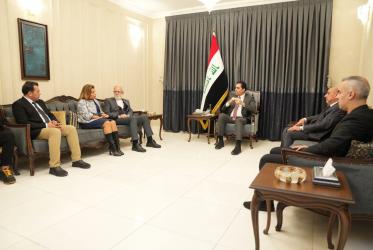Church leaders from Syria, Russia, United States, United Kingdom, France, Germany and Turkey and representatives of international organizations in Geneva gathered for a World Council of Churches consultation on the crisis in Syria together with Mr Kofi Annan and the Joint Representative for Syria, Mr Lakhdar Brahimi.
Churches worldwide have spoken out against the war in Syria. Now is the time to raise one voice for peace and work for a negotiated solution among all parties to the conflict. Blessed are the peacemakers, the Scriptures say. Churches must continue to raise their voice in their congregations and with their governments. We must strengthen the public outcry so that those in power will protect the common interest of humanity.
We believe there can be no military solution to the crisis in Syria. It is time for the international community to assume its responsibility to end the violence and initiate a political process that brings peace for all the people of Syria. Resolute action now is necessary to save lives; waiting has already cost many lives. Collective action for peace is needed to save not only the people of Syria but also the surrounding region as well.
We urge the United Nations Security Council to adopt without delay a resolution based on the 14 September agreement by the Russian and American foreign ministers. We call on the governments of Russia and the United States to exercise their major responsibility for peace, collaborating to convince national and foreign parties to the conflict to put an end to the violence and accept the multilateral compromises that are essential for peace.
The Security Council must also set a date for a second peace conference on Syria, building on the foundations agreed but not implemented after the peace conference in 2012 in Geneva. Many tens of thousands more lives have been lost since then. Many thousands more lives are at stake now. To fail to reach conclusive results at the next Geneva conference is not an option.
The current openings for negotiations also need immediate steps to de-escalate the conflict, including the adoption of an arms embargo by the Security Council and measures to stop the flow of foreign combatants into Syria.
The humanitarian situation in Syria and in neigbouring countries is precarious. Humanitarian assistance is a vital aspect of the churches’ mission and solidarity with those suffering. Such aid also contributes toward a process of reconciliation. National, regional and international church ministries are alleviating the suffering of hundreds of thousands of Syrians affected by the war. It is important for church-related agencies to redouble their efforts now, including aid for refugees. Full humanitarian access is essential, as stipulated in the 2012 Geneva conference.
Christians in Syria are an integral part of a diverse society with a rich history. They have their place in civil society and commit themselves to build a future for Syria where citizens of all faiths enjoy equal rights, freedom and social justice. They are also committed to engage in constructive dialogues with other religious and ethnic communities so that Syria's pluralistic heritage is protected and secured. The WCC and the wider ecumenical family support such a process.
We join the people of Syria in prayer for a peaceful future for the country and the whole Middle East, and may our Lord keep them in His grace.




